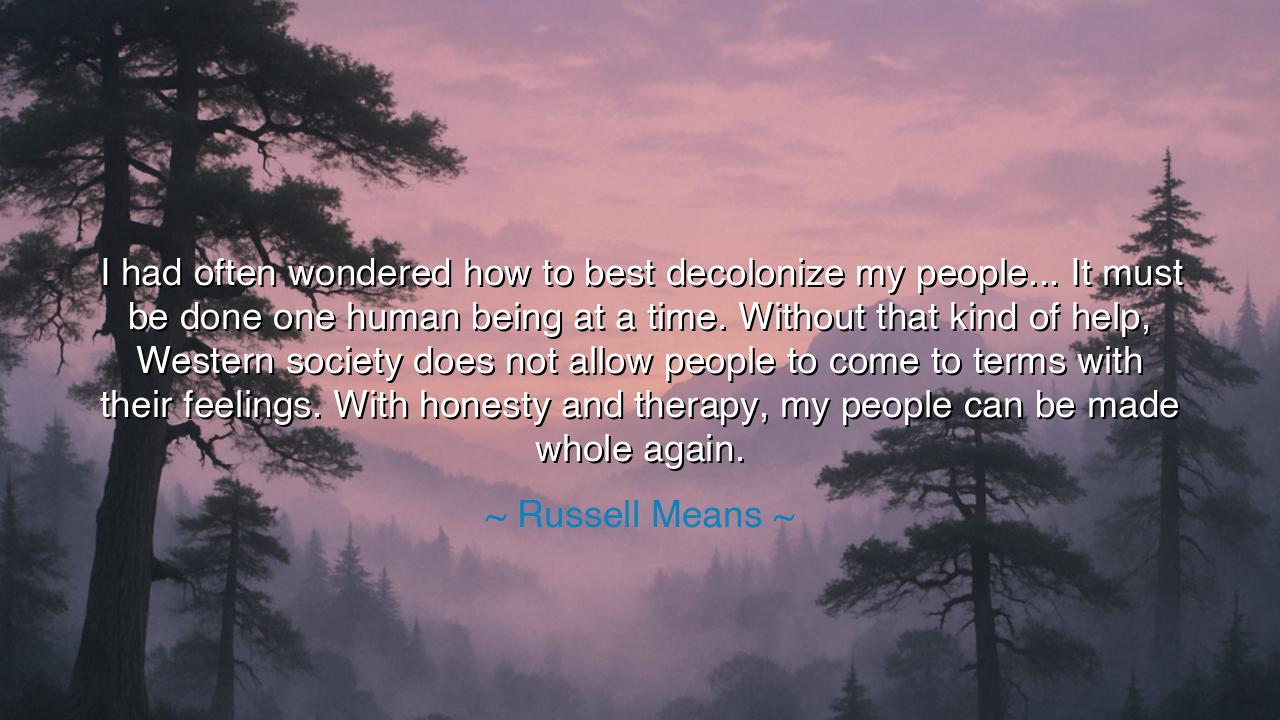
I had often wondered how to best decolonize my people... It must
I had often wondered how to best decolonize my people... It must be done one human being at a time. Without that kind of help, Western society does not allow people to come to terms with their feelings. With honesty and therapy, my people can be made whole again.






Hear the voice of Russell Means, warrior, activist, and son of the Lakota, who carried the burdens of his people and spoke with fire: “I had often wondered how to best decolonize my people... It must be done one human being at a time. Without that kind of help, Western society does not allow people to come to terms with their feelings. With honesty and therapy, my people can be made whole again.” These words, born of suffering and struggle, are not only for the Native nations, but for all who long to heal from wounds inflicted by domination, greed, and disconnection.
For what is decolonization? It is more than the return of land, more than the fall of political structures. It is the restoration of the spirit, the reclaiming of memory, the healing of wounds etched into the hearts of generations. Means teaches us that no law, no treaty, no proclamation alone can make a people whole again. It must begin within the soul of each human being, for colonization did not only steal lands—it sought to crush dignity, silence voices, and fracture identities. Healing, therefore, must move from the inside outward, from the individual to the family, from the family to the nation.
History gives us a painful mirror of this truth. The boarding schools of North America, designed to “kill the Indian and save the man,” tore children from their families, their languages, their traditions. Generations carried the scars of shame, silence, and loss. Governments may now issue apologies, churches may confess their sins, but such words are empty unless the individual human being is given space to grieve, to face the truth, to be healed with compassion. Means understood this: that honesty and therapy are not foreign indulgences but sacred acts of survival, a way to restore what was broken by centuries of oppression.
Consider too the journeys of other peoples scarred by domination. In South Africa, after the end of apartheid, the Truth and Reconciliation Commission sought not only justice but healing. Victims and perpetrators alike spoke aloud what had long been hidden. This act of honesty, painful as it was, allowed wounds to be acknowledged and society to begin mending. Means echoes this same wisdom: healing cannot be decreed from above but must flow through the raw truth of individuals daring to confront their deepest feelings.
Yet he does not only speak of Indigenous peoples. He warns that even Western society itself, in its pursuit of wealth and power, denies its own members the chance to come to terms with their feelings. A culture that prizes conquest over compassion, speed over reflection, image over authenticity, leaves little room for the soul’s wounds to be seen or treated. Colonizer and colonized alike are diminished when emotions are denied, when pain is buried. In this sense, the medicine Means prescribes—honesty and therapy—is not only for his own people, but for all humanity.
The meaning of his words, then, is both heroic and tender: to rebuild a people, you must rebuild the hearts of its members. To restore dignity, you must face the truth of what has been lost. To heal wounds, you must dare to feel them. And though the task is vast, it begins one person at a time, like drops of water gathering into a river, until the current is strong enough to cleanse and renew an entire nation.
The lesson for us, O listeners, is this: do not despise the power of small acts of healing. If you carry wounds, seek out honesty with yourself and with others. Do not fear the work of therapy, whether through counselors, elders, or sacred rituals of your people. If you witness others carrying pain, offer space for their truth to be spoken. Do not expect society to be whole if its individuals are shattered. For in mending one life, you contribute to the mending of all.
Thus remember Russell Means’s wisdom: “It must be done one human being at a time.” Do not be daunted by the vastness of the work, for nations are nothing more than gatherings of souls. Heal the soul, and you heal the people. Heal the people, and you heal the earth. In this way, through honesty and compassion, the world may yet be made whole again.






AAdministratorAdministrator
Welcome, honored guests. Please leave a comment, we will respond soon